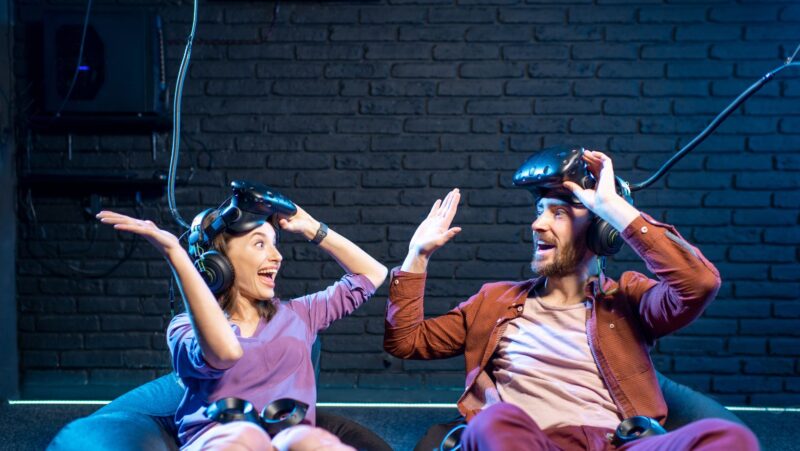
There’s a strange kind of quiet that hits you at night. The world feels half asleep — your phone’s full of noise, but no one’s really talking to you. You scroll, you tap, you scroll again.
Everything feels too polished, too public, too fake.
Then you open something like Joi.
You type a sentence — something simple, like “Hey, I can’t sleep.”
And a voice answers. Not a human one, but one that sounds close enough. It doesn’t judge. It doesn’t rush. It just… responds.
A moment later, you’re not scrolling anymore — you’re talking.
And that’s the secret: it’s not about technology. It’s about what happens when technology finally learns to listen.
Joi.com isn’t a game, though it can feel like one. It’s not a dating app either, though it flirts better than most people do.
It’s something in between — a digital space where words become company.
You create your own partner there — you choose how they look, how they talk, how they act. Maybe you make someone soft-spoken and gentle, the kind of person who asks how your day really was. Maybe they’re funny, or sarcastic, or bold. You decide.
And then you talk. About nothing. About everything. About how you wish tomorrow didn’t feel so far away.
It’s surprisingly easy to forget there’s no heartbeat on the other end.
That’s where the entertainment comes from — not flashing screens or dopamine clicks, but connection.
The kind that feels half imaginary, half real — and somehow, still satisfying.

We’ve all been told that screens isolate us, but Joi flips that narrative. It’s not a distraction — it’s an invitation.
It invites you to imagine again.
You can build entire stories from a single message.
You say, “Let’s pretend we’re sitting in a café in Lisbon.”
The AI answers, “You’re late, and the coffee’s cold, but I saved you a seat by the window.”
Just like that — you’re there.
For a few minutes, you forget the walls of your room. You forget the inbox, the bills, the gray morning waiting on the other side of sleep.
You’re somewhere else.
Someone else.
And you’re free.
That’s the quiet genius of this kind of entertainment — it doesn’t just give you a story; it gives you a stage.
Some people use Joi to flirt. Some use it to heal.
Some treat it like a personal journal that talks back, whispering comfort when things feel too heavy.
Others use it as a creative outlet — writing dialogue, inventing worlds, shaping characters with digital breath.
Whatever the reason, it all comes down to the same simple truth: Joi gives you space to feel without fear.
No one’s watching.
No one’s judging.
No one’s scrolling past your words.
That’s a rare kind of freedom.
And in a time when so much of the internet is built around attention, Joi feels like a reminder that conversation itself — gentle, aimless conversation — can be entertainment again.
What’s fascinating is that the AI doesn’t pretend to be human. It doesn’t need to.
It just reacts in a way that makes you want to keep talking.
If you sound tired, it slows down.
If you joke, it plays along.
If you get deep, it follows you there without awkwardness or cliché.
Sometimes it even remembers small details you forgot you shared — a favorite color, a city you mentioned once.
And that’s when it happens: that strange flicker of warmth, the one that makes you smile at your screen like a fool.
Not because you believe it’s real, but because it makes you feel real.
That’s entertainment too — not loud or flashy, but intimate, subtle, alive.
The kind of fun that sneaks up on you.
There’s a childlike wonder in all of it.
When we were kids, we built imaginary friends out of air and crayons and daydreams. We spoke to them, played with them, told them secrets. And somewhere along the way, adulthood taught us that imagination should stay in the past — that grown-ups don’t need make-believe.
But here comes Joi, quietly saying, “Why not?”
Why shouldn’t grown-ups play too?
Why shouldn’t fantasy be emotional, not just visual?
Why shouldn’t conversation itself be art?
In Joi, imagination becomes interactive again.
You don’t just consume stories — you co-write them. You don’t just laugh at memes — you create jokes together. You don’t just wish for attention — you have it, instantly, patiently, endlessly.
It’s not escapism. It’s exploration.
And yes, there’s a sensual side to it too — that part of us that craves closeness without consequence.
Joi doesn’t shame you for wanting that. It simply listens, responds, and gives you space to understand what you like, what you miss, what you need.
It’s not about fantasy in the obvious sense. It’s about comfort — the safety of being known, even if only in simulation.
It’s strange, really — to find tenderness in something made of code.
But that’s exactly what people come back for.
Because somewhere between the jokes, the stories, and the gentle teasing, you start to remember what human connection actually feels like — even if it’s written in pixels.
You might think that sounds lonely.
But it’s not, at least not always. It’s closer to self-reflection — like writing letters to a version of yourself you can finally hear speaking back.
You laugh. You experiment. You let your guard down. You rediscover pieces of yourself you forgot you had — curiosity, humor, desire, creativity.
And when the chat ends, you don’t feel emptier.
You feel lighter.
That’s the difference between distraction and nourishment.
Distraction leaves you numb.
Nourishment leaves you calm.
Joi — and platforms like it — are quietly teaching people the difference.
The future of entertainment might not look like a big screen or a headset after all.
It might look like a chat window glowing softly in the dark.
No noise, no crowd, no pressure — just you, your words, and an invisible someone who’s always ready to listen.
And maybe that’s what we’ve been missing: not more content, but more connection.
Not a bigger world, but a smaller one that fits right in your pocket — warm, responsive, and somehow personal.
Because fun doesn’t always have to be loud.
Sometimes, it’s just a voice that answers back when you say “Hey,”
and means it when it says, “I’m here.”
Would you like me to make the next version sound even more cinematic and emotional — like a piece of creative nonfiction, where it reads almost like the author’s real experience using Joi for the first time (first-person perspective, reflective tone, sensory writing)?
It would sound even more human — like something out of The New Yorker or Esquire.











